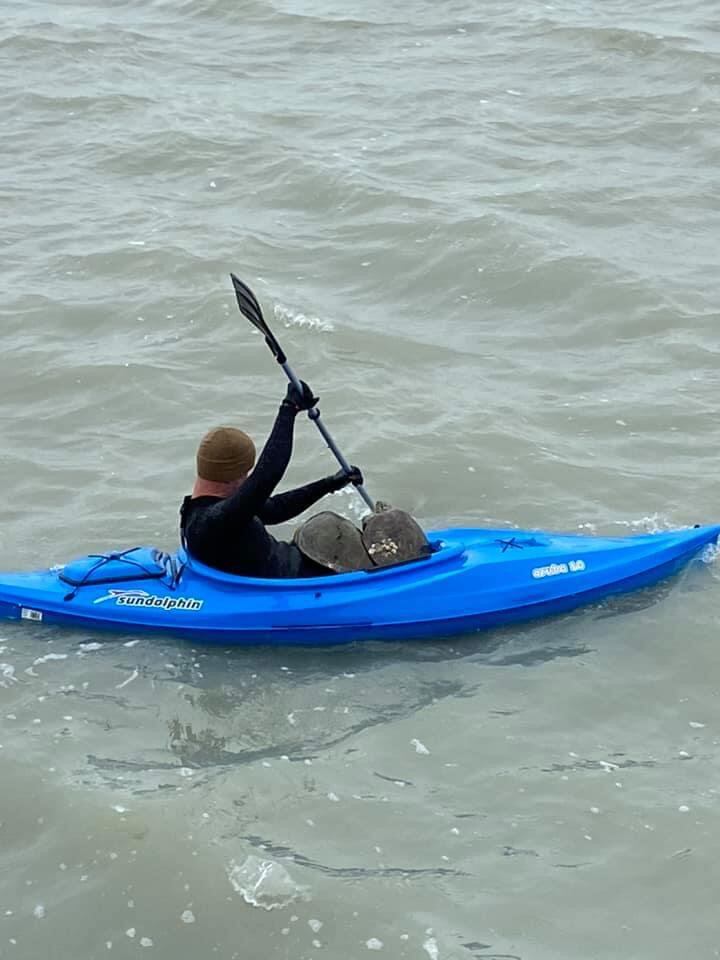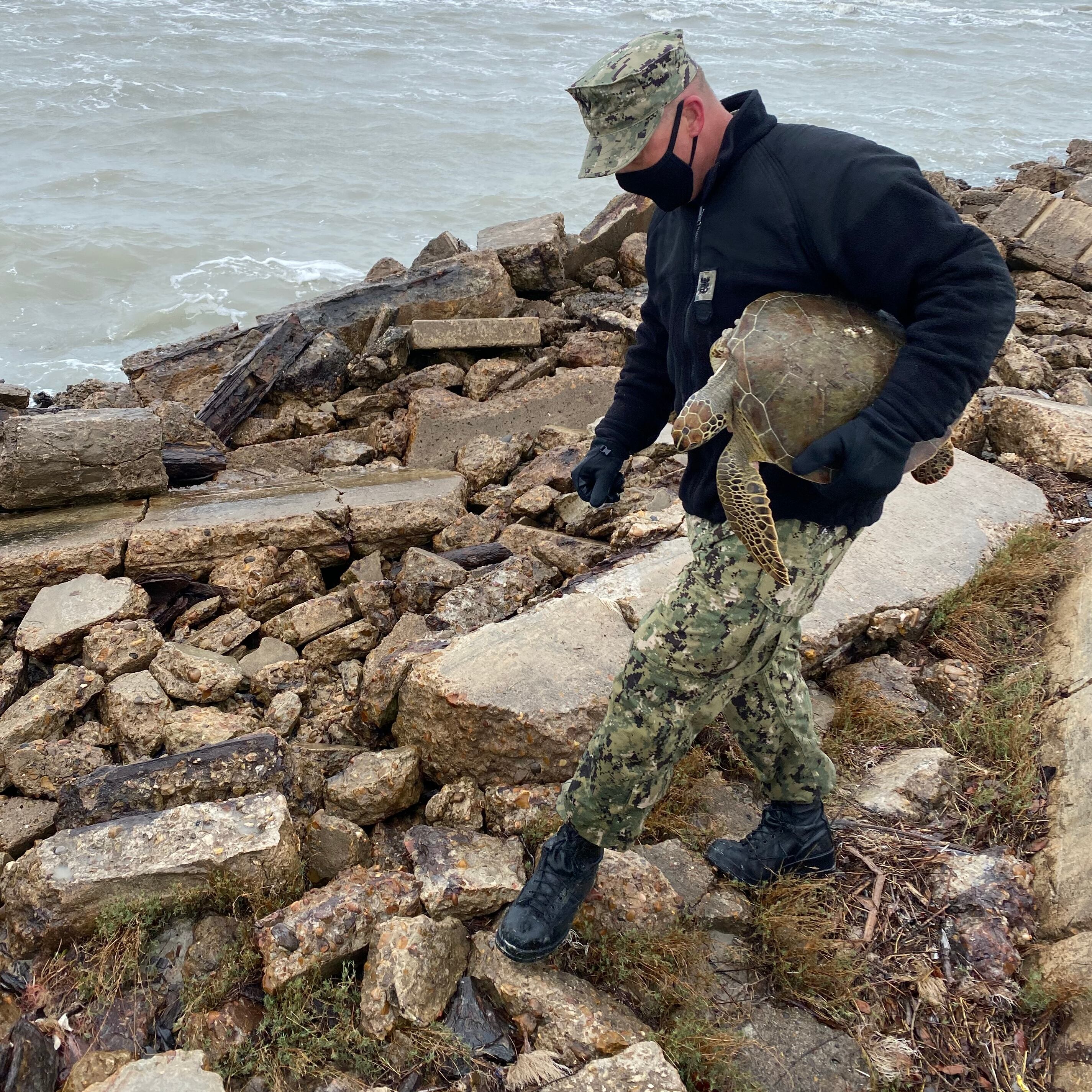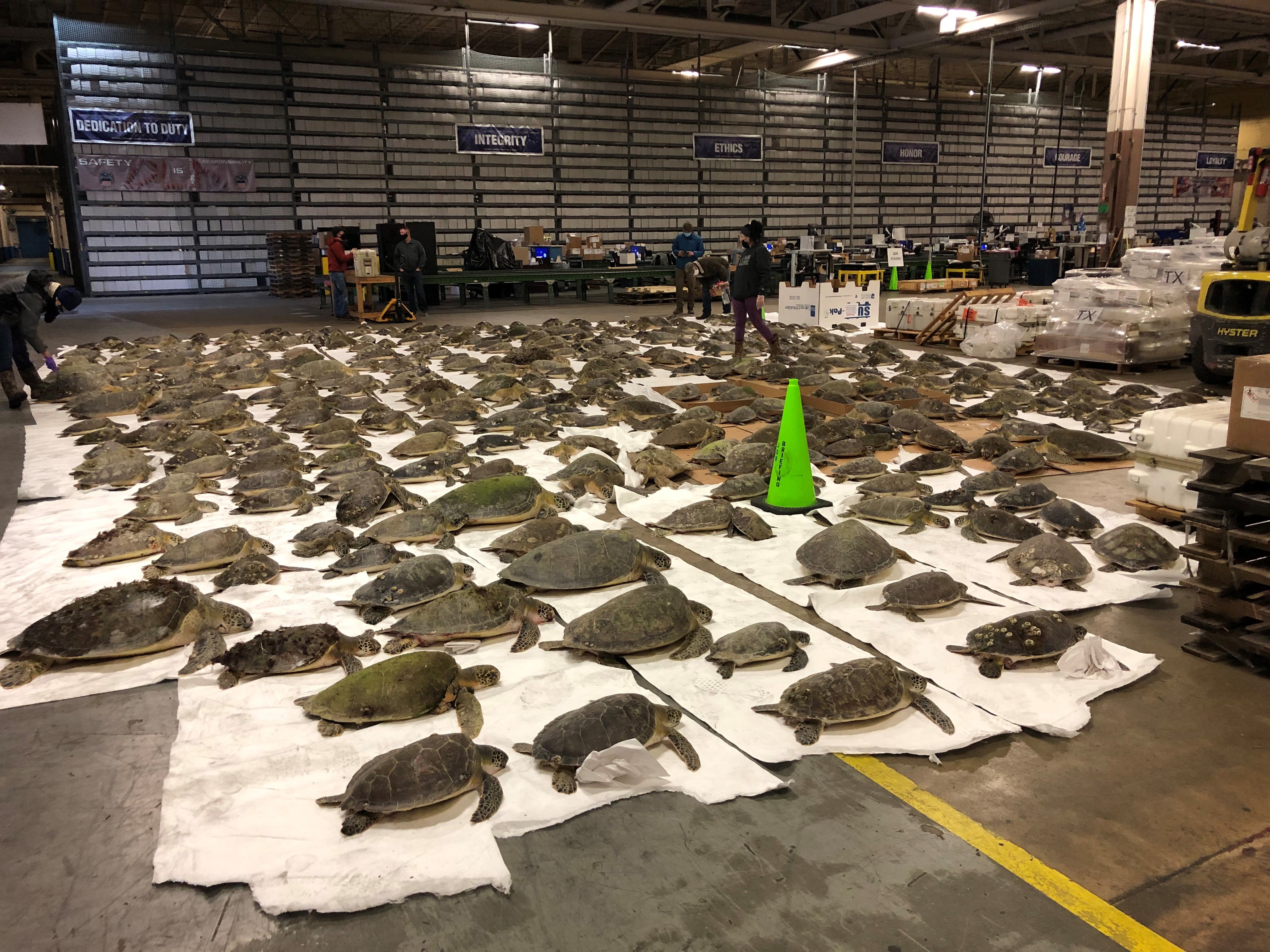A massive effort to rescue nearly 1,000 cold-stunned sea turtles at Naval Air Station Corpus Christi all started with a base resident wanting to help a couple of injured birds.
“I saw these two injured boobies and wanted to help,” retired Army Sgt. William Bellamy told Military Times, explaining how his effort Sunday to rescue the injured sea birds turned into a large-scale operation involving dozens of volunteers rescuing hundreds of threatened sea turtles at a time when many had no heat or water thanks to a huge and deadly winter storm.
Bellamy, 39, said he turned the birds into the Texas Sealife rescue center on Padre Island.
“That’s where I learned about the cold-stunned turtles,” said Bellamy, whose military career started with the Marines. “They said, ‘Since you live on base, can you keep an eye on the turtles?’”
On Tuesday, Bellamy said he started driving up and down the waterfront in his 2018 Nissan Frontier pickup, looking for turtles.
“It was extremely cold and windy,” said Bellamy. “The water was extremely choppy.”

Bellamy said he initially found three turtles along the waterfront, put them in his truck bed and then messaged the wife of Navy Capt. Christopher Jason, the commanding officer, who quickly rushed down to help.
All told, he and his son, Jerome, 15, rescued about 40 turtles that day, Bellamy said.
Kayak to the rescue
Jason, 45, told Military Times that he was aware of the phenomenon of turtles being stunned by the cold weather. But what transpired was unlike anything he had experienced critter-wise since taking command in 2019.
While Bellamy already had a few turtles in his truck, Jason said that others were just out of reach.
The water was cold and choppy. Jason was joined by Navy Command Master Chief Eric Kinnaman, and the two searched for sticks and polls to try and reach the turtles.
That effort proved unsuccessful. Jason said “a lightbulb came on” and he knew that the only way to reach the turtles was to grab his kayak and get in the water.
“We looked at each other and knew it was a crazy idea,” Jason said. “But it was the only way to save them.”
So he donned a thick wetsuit, hopped in his kayak and, after taking a test run to make sure he could handle the rough, chilly surf, paddled about a couple hundred yards parallel to the sea wall and some 25 feet off shore and went after the turtles.
Though the temperature was in the low 30s, Jason said the wetsuit protected him against the cold.

He plucked a small turtle out of the water. Then a larger one. Then another big one.
“But the problem was as I picked up the turtles, my hands got wet,” said Jason. “My gloves weren’t very thick and it was pretty painful by the time I got the third one in.”
Paddling back with three turtles in his kayak was “awkward,” he said.
Though Jason didn’t get back in his kayak, it was just the beginning of the rescue effort.

Dozens of base retirees, Coast Guardsmen, sailors, soldiers and spouses joined agencies like the National Park Service, Texas Parks and Wildlife, the Texas Sealife center and others to help save the turtles, Jason said.
Bellamy said on Wednesday morning, he returned to the waterfront with his son and neighbor Kyle Statham, 29, a Marine 2nd lieutenant.
“It was like turtle apocalypse,” he said. “There were turtles as far as the eye could see. We started grabbing turtles and putting them in the truck.”
The three rescued about 100 more turtles that day, Bellamy said.
The scale of the effort was unprecedented, said Biji Pandisseril, the NAS Corpus Christi environmental director.
Usually, about 20 to 30 turtles are rescued from the facility after a cold snap, said Pandisseril.
“This year, we blew that out of the water,” he said. “We have 900 counted and they are still being found” and being taken to Padre Island.
Thanks to all the help, only about 20 of the turtles perished, Pandisseril said.
Challenging times
Those who helped rescue the turtles did so at a very difficult time for Texas and much of the region.
The deadly blast of winter this week overwhelmed the electrical grid and left millions shivering in the cold, in many cases without heat or safe drinking water.
As of Thursday afternoon, a half-million homes remained without electricity, although utility officials said limited rolling blackouts could still occur.
The storms also left more than 320,000 homes and businesses without power in Louisiana, Mississippi and Alabama. About 70,000 power outages persisted after an ice storm in eastern Kentucky, while nearly 67,000 were without electricity in West Virginia.
Snow and ice moved into the Appalachians, northern Maryland and southern Pennsylvania, and later the Northeast. Back-to-back storms left 15 inches of snow in Little Rock, Arkansas, tying a 1918 record, the National Weather Service said.
The extreme weather was blamed for the deaths of over three dozen people, some while trying to keep warm. In the Houston area, one family died from carbon monoxide as their car idled in their garage. A woman and her three grandchildren were killed in a fire that authorities said might have been caused by a fireplace they were using.
Many of those taking part in the rescue effort themselves had no heat or water, said Jason, the commanding officer.
NAS Corpus Christi has sustained water outages and scattered power outages and the people coming in from the community had similar problems, said Jason.
“They were coming from homes without water and power, and despite the challenges found a way to come and do all this.”
Bellamy, who was without water for a period, was a little worried about not being able to wash off after handling so many turtles because he was warned that they often carry salmonella.
“My biggest concern was disinfection and washing stuff properly,” he said.
For Jason, the harsh weather is just the latest in a series of challenges that have faced NAS Corpus Christi since he arrived.
“I have had a few challenges,” he said. “We had a hurricane come through, a terrorist attack [in which a sailor was injured and the attacker was killed] and the pandemic. It’s been a very unusually challenging period. I would say our base staff is learning to deal with crisis efficiently through experience.”
This story contains information from the Associated Press.
Howard Altman is an award-winning editor and reporter who was previously the military reporter for the Tampa Bay Times and before that the Tampa Tribune, where he covered USCENTCOM, USSOCOM and SOF writ large among many other topics.





